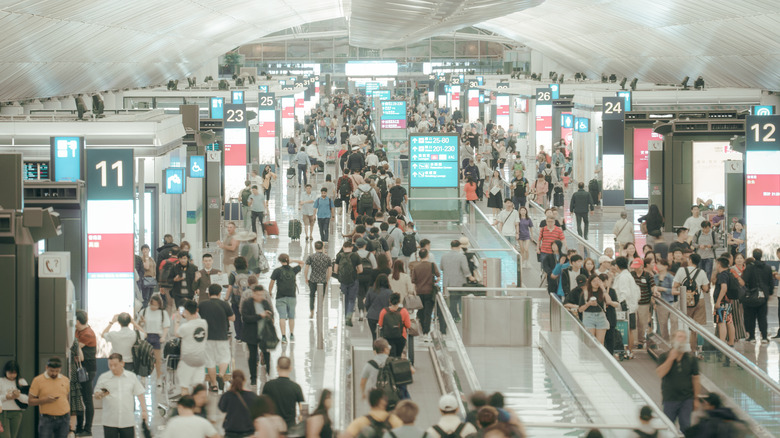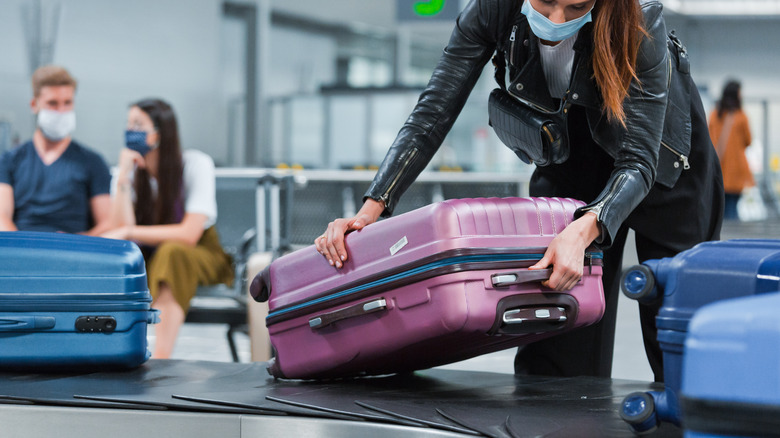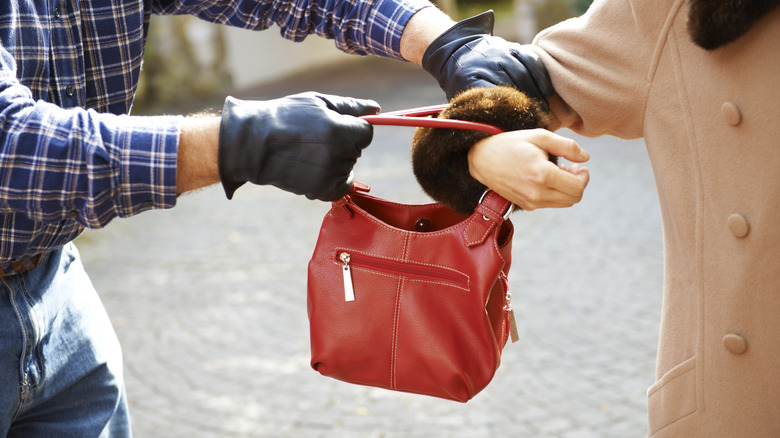The Popular Type Of Bag You Should Avoid Bringing To The Airport On Your Travels
In the flurry of activity around getting ready for a plane trip, you may not put much thought into which bag you're taking, other than whether it holds your stuff. Plus, with checked baggage fees rampant and going up, it's likely that you're stuffing everything you can into a carry-on bag and a personal item. While you probably have a wheeled carry-on suitcase (which is less likely to get damaged than one without wheels), you may be making a big mistake if you're carrying everything you couldn't shove in the suitcase into an over-the-shoulder tote bag. It can be terrible for your posture and the health of your back and shoulders. It can also be easier for a snatch-and-grab thief to take it right off of you and dash away.
A study published in 2012 by the National Library of Medicine evaluated students carrying three different types of bags – shoulder bags, handheld bags, and front packs – each weighing equal to 15% of their own body weight. The study concluded that the shoulder and handheld bags cause more stress and strain on the spine. If you've ever carried a heavy tote for any length of time, you know it can cause pain. There are better alternatives that can hurt less and prevent some theft, and there's even a way to make that tote work for you if you can't bear to give it up.
Why your back and shoulders will thank you for picking the right bag
Tote bags are popular and it's hard to argue with the fact that they look great and fit a lot of stuff. They often have soft sides so you can squish them under the seat in front of you. However, you'll be lugging that bag everywhere: Through the airport to your gate, any time you get food or use the restroom, out of the airport, and then into the hotel. One person on TikTok spoke about the consequences of stuffing her Béis tote (marketed as a "travel bag") so she didn't have to pay a weight overage fee at check-in.
@findingfiona NEVER DOING THIS AGAIN LOL but we finally made it to country 26! 😭🤍 Carrying @Beis Travel weekender and The 29" Large Check-In Roller in Beige ( just don't overfill it like me HAHA) #travel #flight #vlog #australia
But it's not just the bag itself, it's what we put in it, like metal reusable water bottles, computers, books, extra shoes, medications ... the list is endless while the space is not. All that weight on one shoulder or pulling on one arm isn't great for your body. "Someone consistently miscarrying items may develop back and shoulder fatigue, headaches, back pain, and stiffness," Dr. Kevin Lees, chiropractic operations director at The Joint Chiropractic, told Huffington Post. "Nerve damage can result in tingling or numbness and may lead to weakness or loss of grip strength." He says a backpack is a better option, but don't overload it, and carry it on both shoulders to balance the weight. (Using its chest or waist strap can help as well.) Try to put your heavier items in your rolling bag instead.
The correct bag can help prevent theft
In addition to causing pain, tote bags, large or small, can make you more vulnerable to theft. Carrying a bag on one shoulder, in your hand, or on one arm makes it easier for a thief to slip your bag off and run. Plus, some tote bags don't zip up, making it easier for pickpockets to grab something from inside. If you must use your tote bag at the airport, make sure it's one with a sturdy zipper, and put your most important items, like wallets and phones, at the bottom. To that end, if you have a securely closed tote, you can save your shoulders by packing a bungee cord to secure it to the top of your rolling bag.
A crossbody bag may be better as it can be secured in front of you, but you're still putting weight on one shoulder. A backpack on both shoulders secured by a waist or chest strap really makes it difficult for someone to swipe your bag — and can also be used with those bungee cords. We suggest looking for bags with cut-proof straps, RFID blockers so your cards can't be scanned, and zipper closures. Pack it carefully, making sure you know where any items you may need are so you're not rummaging through it (thus leaving it open longer), and email copies of your important travel documents to yourself in a password-protected document, just in case.


